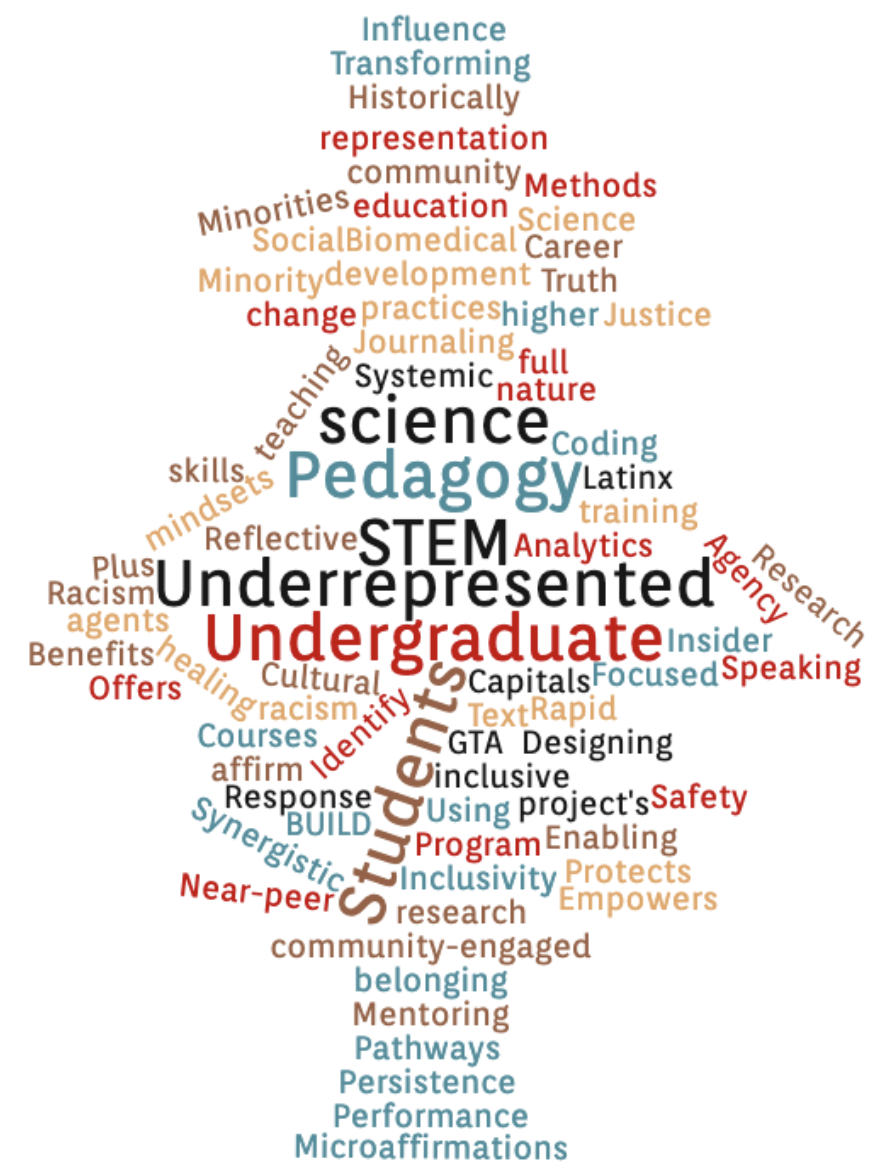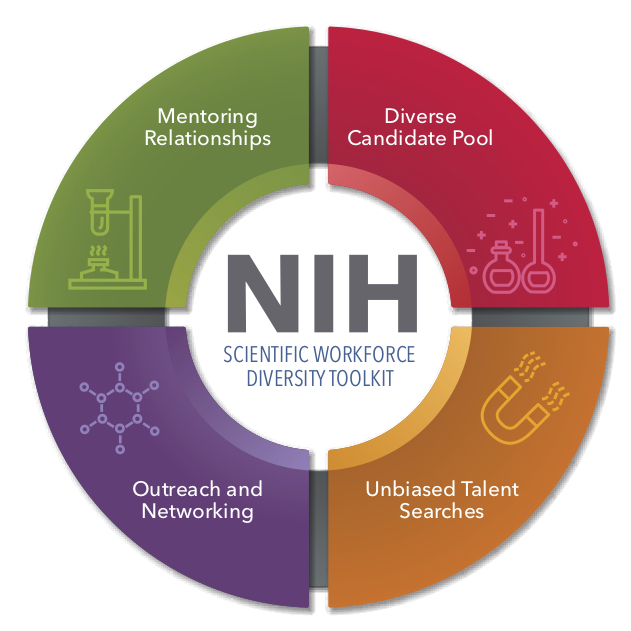Literatures
- Trujillo, G., Aguinaldo, P. G., Anderson, C., Bustamante, J., Gelsinger, D. R., Pastor, M. J., Wright, J., Márquez-Magaña, L., & Riggs, B. (2015). Near-peer STEM Mentoring Offers Unexpected Benefits for Mentors from Traditionally Underrepresented Backgrounds. Perspectives on undergraduate research and mentoring : PURM, 4(1), http://blogs.elon.edu/purm/files/2015/11/Riggs.GT-et-al-PURM-4.1.pdf.
- Estrada, M., Eroy-Reveles, A., Ben-Zeev, A., Baird, T., Jr, Domingo, C., Gómez, C. A., Bibbins-Domingo, K., Parangan-Smith, A., & Márquez-Magaña, L. (2017). Enabling full representation in science: the San Francisco BUILD project's agents of change affirm science skills, belonging and community. BMC proceedings, 11(Suppl 12), 25. https://doi.org/10.1186/s12919-017-0090-9
- Ben-Zeev, A., Paluy, Y., Milless, K. L., Goldstein, E. J., Wallace, L., Márquez-Magaña, L., Bibbins-Domingo, K., & Estrada, M. (2017). 'Speaking Truth' Protects Underrepresented Minorities' Intellectual Performance and Safety in STEM. Education sciences, 7(2), 65. https://doi.org/10.3390/educsci7020065
- Oliver, A., Andemeskel, G., King, C. R., Wallace, L., McDougal, S., Monteiro, K. P., & Ben-Zeev, A. (2017). 'I'm Black and I'm Proud': A Majority Ecological Context Protects Affective Aspects of Black Identity Under Stereotype Threat. Race and social problems, 9(4), 313–320. https://doi.org/10.1007/s12552-017-9216-y
- Estrada, M., Eroy-Reveles, A., & Matsui, J. (2018). The Influence of Affirming Kindness and Community on Broadening Participation in STEM Career Pathways. Social issues and policy review, 12(1), 258–297. https://doi.org/10.1111/sipr.12046
- Estrada, M., Young, G. R., Nagy, J., Goldstein, E. J., Ben-Zeev, A., Márquez-Magaña, L., & Eroy-Reveles, A. (2019). The Influence of Microaffirmations on Undergraduate Persistence in Science Career Pathways. CBE life sciences education, 18(3), ar40. https://doi.org/10.1187/cbe.19-01-0012
- Social Pedagogy, & Eliason, M. (2019). Social Justice Pedagogy Plus: Transforming undergraduate research methods courses
- Taylor, S. D., Veri, M. J., Eliason, M., Hermoso, J. C. R., Bolter, N. D., & Van Olphen, J. E. (2019). The Social Justice Syllabus Design Tool: A First Step in Doing Social Justice Pedagogy. Journal Committed to Social Change on Race and Ethnicity (JCSCORE), 5(2), 133–166. https://www.jstor.org/stable/48645358
- Kepple, C., Tilahun, M., Matti, N., & Coble, K. (2020, July 22-23). Pedagogy training for the development of GTA mindsets and inclusive teaching practices. Paper presented at Physics Education Research Conference 2020, Virtual Conference. Retrieved June 19, 2023, from https://www.compadre.org/Repository/document/ServeFile.cfm?ID=15495&Doc…
- Norris, K. C., McCreath, H. E., Hueffer, K., Aley, S. B., Chavira, G., Christie, C. A., Crespi, C. M., Crespo, C., D'Amour, G., Eagan, K., Echegoyen, L. E., Feig, A., Foroozesh, M., Guerrero, L. R., Johanson, K., Kamangar, F., Kingsford, L., LaCourse, W., Maccalla, N. M., Márquez-Magaña, L., … Seeman, T. (2020). Baseline Characteristics of the 2015-2019 First Year Student Cohorts of the NIH Building Infrastructure Leading to Diversity (BUILD) Program. Ethnicity & disease, 30(4), 681–692. https://doi.org/10.18865/ed.30.4.681
- Nayak, K., Krishna, S., Tran, K., Harris, M., Barrera, A. M., Coble, K., & Kulkarni, A. (2020). Using text analytics on reflective journaling to identify cultural capitals for STEM students. 2020 19th IEEE International Conference on Machine Learning and Applications (ICMLA). https://doi.org/10.1109/icmla51294.2020.00130
- Paul H. Barber et al. ,Systemic racism in higher education.Science 369,1440-1441(2020).DOI:10.1126/science.abd7140
- Burrus, L. W., Samayoa, C., Riggs, B., & Parangan-Smith, A. (2021, January 5). Teaching science through a social justice and racially inclusive lens (opinion). Inside Higher Ed | Higher Education News, Events and Jobs.
- https://www.insidehighered.com/advice/2021/01/06/teaching-science-throu…
- Johnson, E., Samayoa, C., Mendez, R., Wong, M., Velazquez, E., & Márquez-Magaña, L. (2021). Insider community-engaged research for Latinx Healing in nature: Reflections on and extensions from phase 1 of the promoting activity and stress reduction in the outdoors (PASITO) project. Parks Stewardship Forum, 37(1). https://doi.org/10.5070/p537151709
- Mehta, K.M., Ceberio, N., Vernard, S. et al. Designing a biomedical coding program focused on inclusivity and agency. Nat Comput Sci 1, 242–243 (2021). https://doi.org/10.1038/s43588-021-00063-6
- Tran, K., Barrera, A. M., Coble, K., Arreguin, M., Harris, M., Macha-Lopez, A., Perez, M., & Eroy-Reveles, A. (2022). Cultivating cultural capitals in introductory algebra-based physics through reflective journaling. Physical review. Physics education research, 18(2), 020139. https://doi.org/10.1103/physrevphyseducres.18.020139
- Hiatt, R. A., Carrasco, Y. P., Paciorek, A. L., Kaplan, L., Cox, M. B., Crespo, C. J., Feig, A., Hueffer, K., McFerrin, H., Norris, K., Roberts-Kirchhoff, E., Saetermoe, C. L., Silver, G. B., Snyder, K., Zavala, A. R., Parangan-Smith, A. G., & Diversity Program Consortium (2022). Enhancing grant-writing expertise in BUILD institutions: Building infrastructure leading to diversity. PloS one, 17(9), e0274100. https://doi.org/10.1371/journal.pone.0274100
- Harris, M., Rosser, S., Goldman, M., Márquez-Magaña, L., & Rohlfs, R. V. (2023). Improving biology faculty diversity through a co-hiring policy and faculty agents of change. PloS one, 18(5), e0285602. https://doi.org/10.1371/journal.pone.0285602
- Mendez, R., Velazquez, E., Gimenez, A., Michaud, M., Mendez, J., Wong, M., Quesada, J., Márquez-Magaña, L., & Samayoa, C. (2023). The Impact of Insider Researcher Trainees in Recruiting and Retaining Latinx in an Outdoor Health Promotion Research Study. Journal of racial and ethnic health disparities, 1–13. Advance online publication. https://doi.org/10.1007/s40615-023-01642-1
- Márquez-Magaña, L. (2024). Anti-deficit is anti-racist and transformative. Patterns. https://doi.org/10.1016/j.patter.2024.100934

Webinar Slides
SF BUILD Presentation Slides (PDF)
Literatures
Trujillo G, Aguinaldo PG, Anderson C, Bustamante J, Gelsinger D, Pastor M, Wright J, Marquez-Magana L, Riggs B. 2015. Near-peer STEM Mentoring Offers Unexpected Benefits for Mentors from Traditionally Underrepresented Backgrounds. Perspectives on Undergraduate Research and Mentoring, 4(4.1) |(PDF)
Ben-Zeev, A. Paluy, Y., Milless, K.L., Goldstein, E.J., Wallace, L., Marquez-Magana, L., Bibbins-Domingo, K., Estrada, M. (2017). Underrepresented Minorities' Intellectual Performance and Safety in STEM. Education Sciences, 7(65), 1-12.(PDF)
Estrada, M., Eroy-Reveles, A., Ben-Zeev, A., Baird, T., Domingo, C., Gomez, C.A., Bibbins-Domingo, K., Parangan-Smith, A., Marquez-Magana, L. (2017). Enabling full representation in science: The San Francisco BUILD project's agents of change affirm science skills, belonging and community. BMC Proceedings. 11(Suppl 12)(25), 57-67.(PDF)
Estrada, M., Eroy-Reveles, A., Matsui, J. (2018). The Influence of Affirming Kindness and Community on Broadening Participation in STEM Career Pathways. Social Issues and Policy Review, 12(1), 258-297.(PDF)
Eliason, M.J. (2019) Social Justice Pedagogy Plus: Transforming undergraduate research methods courses. Amazon Kindle Direct | Website
Estrada, M, Young, G, Nagy, J., Goldstein, E.J., Ben-Zeev, A., Marquez-Magana, L.M., Eroy-Reveles, A. (2019). The Influence of Microaffirmations on Undergraduate Persistence in Science Career Pathways, CBE Life Sicences Education, 18(3): ar30-mr3(PDF)
NIH Scientific Workforce Diversity Toolkit (PDF)
"A free, downloadable interactive resource from the NIH Scientific Workforce Diversity (SWD) Office that institutions can use to help advance their own faculty diversity and inclusion. The toolkit guides users through evidence-based interrelated activities that SWD is currently using to foster an inclusive culture that unleashes the power of diversity to achieve research and institutional excellence." (National Institute of Health Office of the Director, Scientific Workforce Diversity)
Visit the NIH Scientific Workforce Diversity website for more information.

Walton, G. M., & Cohen, G. L. (2011).A Brief Social-Belonging Intervention Improves Academic and Health Outcomes of Minority Students. Science, 331(6023), 1447-1451. doi:10.1126/science.1198364(PDF)
Yeager, D. S., & Dweck, C. S. (2012). Mindsets That Promote Resilience: When Students Believe That Personal Characteristics Can Be Developed. Educational Psychologist, 47(4), 302-314. doi:10.1080/00461520.2012.722805(PDF)
Mendes, W. B., Major, B., Mccoy, S., & Blascovich, J. (2008). How attributional ambiguity shapes physiological and emotional responses to social rejection and acceptance. Journal of Personality and Social Psychology, 94(2), 1-25. doi:10.1037/0022-3514.94.2.278(PDF)
Freeman, J. B., Ambady, N., & Holcomb, P. J. (2010). The face-sensitive N170 encodes social category information. NeuroReport, 21(1), 1-9. doi:10.1097/wnr.0b013e3283320d54(PDF)
Johns, M, Schmader, T., and Martens A. 2005. Knowledge is half the battle: Teaching stereotype threat as a means of improving women’s math performance. Psychological Science 16:175-179. DOI: 10.1111/j.0956-7976.2005.00799.x(PDF)
Ho, A. K., & Sidanius, J. (2009). Preserving positive identities: Public and private regard for one's ingroup and susceptibility to stereotype threat. Group Processes & Intergroup Relations, 13(1), 55-67. doi:10.1177/1368430209340910(PDF)
D'Lauro, C., Tanaka, J. W., & Curran, T. (2008). The preferred level of face categorization depends on discriminability. Psychonomic Bulletin & Review, 15(3), 623-629. doi:10.3758/pbr.15.3.623(PDF)